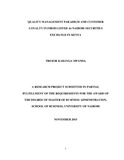| dc.description.abstract | The purpose of this study was to establish the relationship between quality management
paradigm and customer loyalty in manufacturing and service companies listed in Nairobi
Securities Exchange. The study adopted a statistical cross-sectional research design in
which a census survey and stratified random sampling was used. Primary data was
collected from 20 firms listed in NSE and the analysis done using SPSS to generate the
descriptive statistics of the data. Correlation and regression analysis was performed and
the study found that there is a positive correlation of 0.912 between customer loyalty and
customer value and a positive correlation of 0.974 between customer loyalty and quality
management paradigm. When regression analysis was performed, the study found that
there is a good linear association between the dependent and independent variables used
in the study. Further analysis found that the benefits of quality management paradigm
include; reduced costs, customer satisfaction, increased efficiency, competitive
advantage, elimination of defects, organization development, enhanced shareholder and
stakeholder value, reduced complaints, increased job security, and increased financial
performance. This study therefore, recommends that organization to fully adopt the
quality management paradigm in order to improve and maintain customer loyalty, which
will in turn result to the benefits. | en_US |

